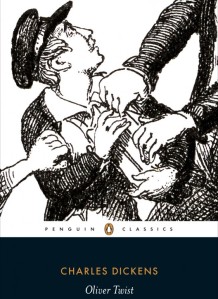Oliver Twist: Reading is a Crime?
To what extent is reading seen as a crime by Oliver Twist? This can be seen in chapter 20 of Oliver Twist:
‘He remained lost in thought for some minutes; and then, with a heavy sigh, snuffed the candle, and, taking up the book which the Jew had left with him, began to read.
He turned over the leaves. Carelessly at first; but, lighting on a passage which attracted his attention, he soon became intent upon the volume. It was a history of the lives and trials of great criminals; and the pages were soiled and thumbed with use. Here, he read of dreadful crimes that made the blood run cold; of secret murders that had been committed by the lonely wayside; of bodies hidden from the eye of man in deep pits and wells: which would not keep them down, deep as they were, but had yielded them up at last, after many years, and so maddened the murderers with the sight, that in their horror they had confessed their guilt, and yelled for the gibbet to end their agony. Here, too, he read of men who, lying in their beds at dead of night, had been tempted (so they said) and led on, by their own bad thoughts, to such dreadful bloodshed as it made the flesh creep, and the limbs quail, to think of. The terrible descriptions were so real and vivid, that the sallow pages seemed to turn red with gore; and the words upon them, to be sounded in his ears, as if they were whispered, in hollow murmers, by the spirits of the dead.
In a paroxysm of fear, the boy closed the book, and thrust it from him. Then, falling upon his knees, he prayed Heaven to spare him from such deeds; and rather to will that he should die at once, than be reserved for crimes, so fearful and appaling. By degrees, he grew more calm, and besought, in a low and broken voice, that he might be rescued from his present dangers; and that if any aid were to be raised up for a poor outcast boy who had never known the love of friends or kindred, it might come to him now, when, desolate and deserted, he stood alone in the midst of wickedness and guilt.
He had concluded his prayer, but still remained with his head buried in his hands, when a rustling noise aroused him.’ (Oliver Twist, Chapter 20).
Oliver picks up a ‘book which the Jew had left with him’ and begins to read it even though he knows that reading is frowned upon. He looks over the pages which were ‘soiled and thumbed with use’ because previous readers haven’t been able to stop reading. Oliver reads the ‘trials of great criminals’ and his ‘blood runs cold’ as he reads these notorious ‘secret murders that had been committed’. At this time, history of the lives and trials of great criminals were widely popular and largely read.
The stories shock Oliver, and start to appear ‘real and vivid’ so much so that he could hear ‘the spirits of the dead’ whispering into his ears. Consequently, he closes the book and throws it and kneels down and begins to pray wanting to be ‘spared’ from the deeds he has read. As he prays he grows calmer but feels guilty.
Dickens highlights the horrors that follow reading, he shows us the unsettling things that happen when you read and how praying will rescue you. After he has finished his prayer he still keeps his head in his hands, suggesting that is what he should keep in his hands: not a book.
Dickens, Charles. Oliver Twist. New York: Bantam, 2004. Print. Chapter 20.
